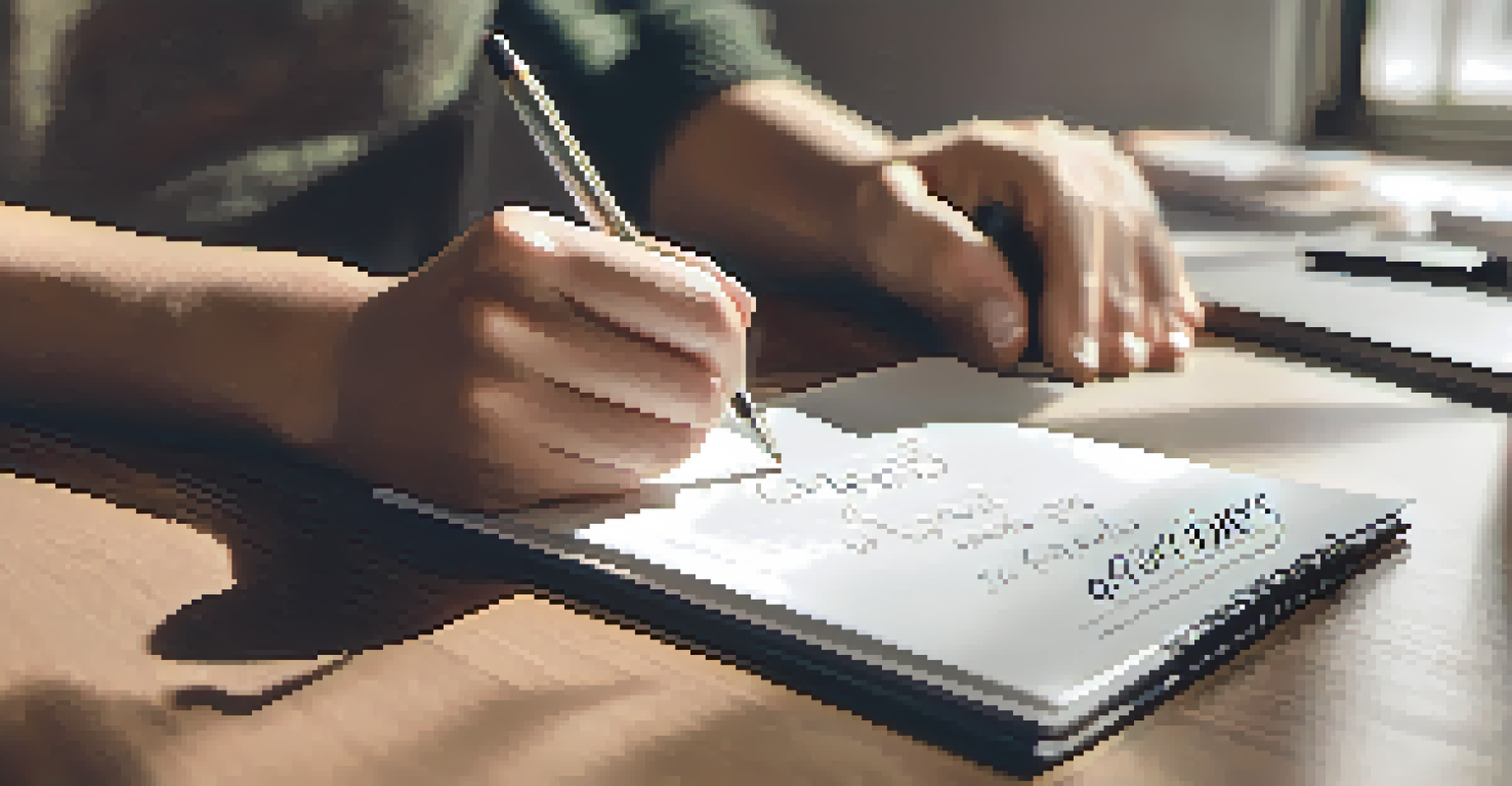How to Prepare for a Mortgage Interview with Lenders

Understanding the Mortgage Interview Process
Before diving into preparation, it's crucial to understand what a mortgage interview entails. This is your chance to discuss your financial situation with lenders and explore your options for securing a mortgage. Think of it as a two-way street where both you and the lender assess whether you're a good fit for each other.
Success is where preparation and opportunity meet.
During this interview, lenders will ask about your income, credit history, and overall financial stability. They want to gauge your ability to repay the loan, which means being transparent is key. The more they know about you, the better they can tailor their offerings to suit your needs.
Remember, this process isn't just about proving yourself to the lender; it's also about finding the right lender for you. Make sure you feel comfortable and confident in their capabilities, as this relationship will be crucial throughout your home-buying journey.
Gathering Necessary Financial Documents
One of the most important steps in preparing for a mortgage interview is gathering your financial documents. This typically includes your pay stubs, tax returns, bank statements, and information about any debts you currently have. Having these documents organized will not only streamline the process but also show lenders that you're serious.

Consider creating a dedicated folder—either physical or digital—where you can keep all relevant documents. This will make it easier to locate and share what you need during the interview. Plus, it demonstrates to lenders that you're prepared and responsible, which can leave a positive impression.
Prepare Financial Documents
Gathering essential financial documents like pay stubs and tax returns is crucial to demonstrate your readiness for a mortgage interview.
If you're unsure about what specific documents to bring, don’t hesitate to reach out to your lender in advance. They can provide you with a checklist of required materials, ensuring you have everything ready for the big day.
Reviewing Your Credit Report and Score
Your credit report and score play a significant role in the mortgage approval process. Before your interview, take the time to review your credit report for any inaccuracies or issues that may raise red flags. By understanding your credit history, you can address potential concerns proactively during your conversation with lenders.
The best way to predict the future is to create it.
Many lenders will check your credit score as part of their assessment, so it’s wise to know where you stand. Aim for a score that falls within a favorable range to improve your chances of securing a loan with good terms. If your score needs some work, consider taking steps to boost it before the interview.
Remember, lenders want to see that you’re a responsible borrower. If there are negative marks on your credit report, be prepared to explain them honestly and discuss what steps you’re taking to improve your financial situation.
Knowing Your Budget and Loan Options
Before stepping into the interview, it’s essential to have a clear understanding of your budget. Know how much you can afford to put down and what monthly payments fit comfortably within your financial landscape. This clarity will not only help you communicate effectively with lenders but also ensure you don’t overextend yourself.
Additionally, familiarize yourself with different loan options available to you, such as fixed-rate mortgages, adjustable-rate mortgages, or government-backed loans. Each type comes with its own set of advantages and drawbacks, so knowing your preferences will empower you during discussions.
Review Your Credit Score
Understanding your credit report and score beforehand enables you to address potential issues and improves your chances of mortgage approval.
Don’t hesitate to ask lenders about the various products they offer, and compare these options against your budget. This will help you make an informed decision and select a mortgage that suits your long-term financial goals.
Preparing Questions for Your Lender
An interview is a two-way conversation, so it’s vital to prepare questions for your lender. Think about what matters most to you in a mortgage, whether it’s interest rates, loan terms, or fees. Having a list of questions ready shows that you’re engaged and serious about the process.
Consider asking about the lender's experience, the types of loans they specialize in, and what the timeline looks like for approval. These questions can help you gauge whether this lender aligns with your needs and expectations.
Also, don't shy away from inquiring about the lender's communication style. Understanding how often and through which channels they will keep you updated can help set the stage for a smooth lending experience.
Dressing Professionally for the Interview
First impressions matter, especially in a professional setting like a mortgage interview. Dressing appropriately can help convey your seriousness and professionalism. Aim for business casual attire that makes you feel confident and comfortable.
Your appearance can influence how lenders perceive you, so take a moment to choose an outfit that represents the best version of yourself. It’s not just about looking good; it’s about feeling empowered to discuss your financial future.
Ask Questions During Interview
Preparing thoughtful questions for your lender shows engagement and helps ensure you choose the right mortgage option for your needs.
Remember, this interview is about establishing a relationship. A professional appearance can help create a positive atmosphere and signal to lenders that you are committed to the process.
Following Up After the Interview
After the interview, don’t forget to follow up with the lender. A simple thank-you email can go a long way in reinforcing your interest and appreciation for their time. It also serves as a reminder of your eagerness to move forward in the mortgage process.
In your follow-up, you might also want to reiterate any key points discussed during the interview or ask any lingering questions that may have come to mind. This keeps the lines of communication open and shows that you’re proactive about your mortgage journey.

Lastly, be patient as you await their response. The mortgage process can take time, but your diligence in following up will demonstrate your commitment and may help keep you top of mind.